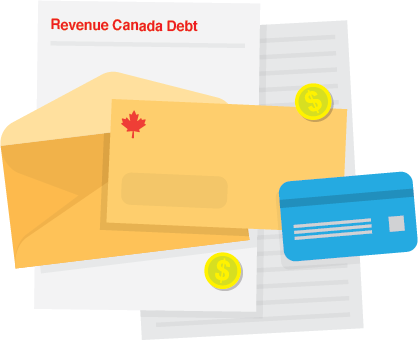Clear Up Income Tax Arrears
- Stop high-interest and past-due income tax arrears
- Avoid potential CRA liens and more
- Equity based financing solutions
- Specialized support dealing with CRA liens and judgements
- Approvals in as little as 24 hours

Quick Options For Revenue Canada Debt
Once you fall a few years behind on your income taxes, it can be a daunting task to get things back on track.
The interest accrual alone can increase your existing balance to almost double in one year if a partial or full payment is not made. There is also the intimidation factor that debt can represent in your mind.
The Canada Revenue Agency is willing to work with you but if you derail from any agreed-upon arrangements all bets are off. The time and mental stress it takes to deal with the CRA can impact more than just your bank account.
The amount of paperwork required to go through an audit can be extensive and becomes a full-time job in itself. Furthermore; overdue taxes can become a burden on your family and home life.

What can the Canada Revenue Agency do?
CRA has the right to ask your existing bank(s) to freeze your bank account and garnish your monthly wages; as a result, anything that gets deposited would be withheld to help satisfy payment with the CRA. Arbitrarily assess any income tax returns not yet filed and apply penalties and interest (backdated) to the amount owing.
File a lien against your property to ensure the debt is paid when the property is sold, refinanced or pursued under the power of sale/foreclosure. The Canada Revenue Agency is not required to notify you of any lien that is placed on your property. Normally if your income taxes outstanding are so far gone your paired up with a CRA account representative who is designated to handle your file with them.
During any correspondence with them, they may let you know that their next step would be to place a lien on your home. This would only be one of the ways you would find out about a lien being placed on your home due to past-due taxes.
CRA Arrears
If you are facing an overwhelming tax bill it’s best to consult professionals. If you do not have a CRA expert working on your behalf, seek the help of an accountant, income tax lawyer or both. They will have the ability to work through your past and present tax filings to find a suitable approach to help aid in your quest to fight your current tax bill.
CRA (Canada Revenue Agency) normally goes to drastic measures when you are unable to meet payment demands or simply unable to come to an agreement on what you owe. It is important that you or your tax professional communicate regularly so that the Canada Revenue Agency is fully aware of where you stand with your income taxes. What types of CRA debt can you assist with?
There is no boundary to the type of CRA debt the team at LendToday can assist with when it comes to you and even your business. Our team of specialists has seen it all and worked to help those facing income tax arrears find a suitable solution to bring things back into good standing.
Some of the issues we can help you secure financing for to resolve CRA issues…
Personal Income Tax
Personal income tax is what individuals owe on employment, self-employment, investment, and other taxable income for the year. Balances typically arise when too little tax was withheld at source, you had self-employed income without installments, or you reported a capital gain. If unpaid, the CRA can add interest/penalties and use collection actions (requirements to pay, wage garnishment, bank freezes, property liens).
How we help: If cash flow is tight, a second mortgage, HELOC, or short-term home-equity loan can clear the tax debt quickly and reduce monthly stress while you set up a long-term plan.
GST/HST Remittances
If you’re registered for GST/HST, you must collect tax from customers and remit the net amount to the CRA on your filing schedule. Debts happen when cash flow is used before remitting, filings are late, or an audit finds under-reported sales. Unremitted GST/HST is considered trust money, and directors of a corporation can be held personally liable. CRA can issue requirements to pay, freeze accounts, or register liens.
How we help: Equity-based financing can retire the arrears, protect day-to-day operations, and give you time to rebuild reserves and stay current on future filings.
Corporate Tax (T2)
Corporations pay income tax on profits and often must make installments through the year. Amounts owing accumulate when profits exceed expectations, installments are missed, or loss carryforwards don’t apply as planned. While directors are generally not personally liable for corporate income tax itself, CRA can still take strong collection steps against the company (and directors remain at risk for separate GST/HST or payroll source-deduction arrears).
How we help: Using business or personal home equity to clear the corporate balance can restore banking stability, keep supplier relationships intact, and position the company for conventional financing later.
Customs & Excise tax/duties
Customs duties apply to certain imported goods, and excise taxes/duties apply to products like fuel, alcohol, and tobacco. Amounts can accrue from assessments after import reviews, classification/valuation issues, or late filings in regulated industries. CRA (and CBSA for customs) can assess interest and pursue collection similarly to other program accounts.
How we help: A fast equity solution can resolve assessed balances so shipments aren’t disrupted and licenses/permits aren’t at risk, while you implement better compliance processes going forward.
CERB (repayments/overpayments)
CERB was an emergency benefit. If you were later found ineligible or overpaid, the CRA can require repayment. These balances can affect refunds and may trigger collection activity if ignored. While principal forgiveness is rare, payment arrangements may be available based on your ability to pay.
How we help: If a lump-sum repayment is required, tapping home equity can settle the amount immediately, stop further collection pressure, and let you spread repayment over a manageable term.
Combined Income Tax Arrears
Got multiple CRA balances piling up? We’ll help you combine income tax arrears—along with GST/HST, payroll source deductions, corporate tax, customs/excise assessments, or CERB repayments—into one manageable solution. Using your home equity (second mortgage, HELOC, or refinance), you can clear liens, stop wage garnishments, and lower monthly stress, even with bruised credit. We’ll map out the fastest, most affordable path so you can protect your home and get back on track.
Loans To Pay Off Tax Debt Canada
With other monthly obligations to focus on you simply may not have readily available resources to pay what you owe. If you are a homeowner and you have equity in your home, there is a good chance you can utilize the equity you have to help payoff your taxes. Traditional lenders such as your bank or credit union will often refuse to assist when it comes to large tax balances owing.
They often feel that it could be the result of on an ongoing issue or that you will continue to find yourself in trouble with the CRA. The only time your home bank may consider helping is if the balance is relatively small – under $5,000.00. Some common home equity financing solutions to payoff your CRA bill…
- Second Mortgage – fast lump sum; best when you need to clear a lien or large balance in 12–24 months before refinancing.
- Home Equity Line of Credit – revolving credit; best when you qualify with income/credit and want access for future tax installments.
- Home Equity Loans – fixed term & payment; best when you want predictability vs. a line of credit.
- Accredited Private Mortgage – equity-focused approvals; best when CRA arrears or a lien blocks bank financing.
- Sub-Prime B Lender – consolidate mortgage + CRA into one payment; best with ≥20% equity and stable income.
Pay off CRA Debt with Mortgage
Equity-based solutions—like a second mortgage, HELOC, or refinance—can clear CRA arrears quickly, improve cash flow, and help prevent/discharge a tax lien. Banks usually require CRA balances to be paid first; private and B-lenders can bridge that gap.
Waiting increases interest/penalties and the risk of enforcement (garnishments, freezes, liens)—see the table below.
Who does this help?
Whether you’re self-employed, incorporated, in a partnership, or behind on personal income tax or GST/HST, address it head-on to avoid higher costs later. We’ve helped Canadian homeowners in many situations and will tailor a plan to your credit, income, and home equity.
CRA collection actions vs. homeowner solutions
| CRA Action | What It Means | Impact on You | Typical Timeline | Solution Options |
|---|---|---|---|---|
| Interest & Penalties Early Stage | Balance grows monthly until paid; penalties may apply if returns are late. | Cost snowballs Higher payoff required over time. | Begins once assessed; ongoing. | Payment arrangement (CRA) Home equity loan / 2nd mortgage HELOC (if available) |
| Requirement to File Returns Prerequisite | CRA won’t finalize arrangements until outstanding returns are filed. | Delays relief until filings are current. | As soon as possible. | File all outstanding returns Work with accountant |
| Payment Arrangement Negotiated | CRA may accept monthly payments based on ability to pay. | Stops escalation if honoured; interest usually continues. | Set after disclosure of income/expenses. | Budget + stick to plan Refinance to lower monthly cost |
| Wage Garnishment Enforcement | CRA notifies employer to remit part of wages directly. | Cash flow hit may strain other bills. | Can happen quickly after notices. | Urgent payment arrangement Home equity loan / 2nd mortgage Consumer proposal (trustee) |
| Bank Account Freeze Enforcement | Funds in your account can be frozen/redirected to CRA. | Bills may bounce → fees & credit risk. | After demand letters if no response. | Contact CRA same-day Bridge with equity-based loan Proposal/insolvency advice |
| Property Lien (Memorandum) Secured | CRA registers a claim against your home; must be cleared on sale/refinance. | Blocks refinancing until debt is paid or settled. | After sustained non-payment. | Equity loan/second mortgage to clear lien Refinance with B/private lender |
| Forced Sale (rare) Last Resort | In severe cases, CRA can seek a court order to sell assets. | Loss of home if unresolved. | Only after other measures. | Immediate legal advice Settle via refinance/equity Trustee solutions |
| Taxpayer Relief Request Relief | CRA may cancel/waive penalties or interest in limited situations. | Reduces total cost if approved. | Case-by-case; requires documentation. | Apply with supporting evidence Pair with payment plan or refinance |
Struggling with CRA debt? We help homeowners solve it fast.
Explore repayment plans, home-equity solutions, or refinancing options that fit your budget—even with bruised credit.
Call 1-855-242-7732 or Apply Now